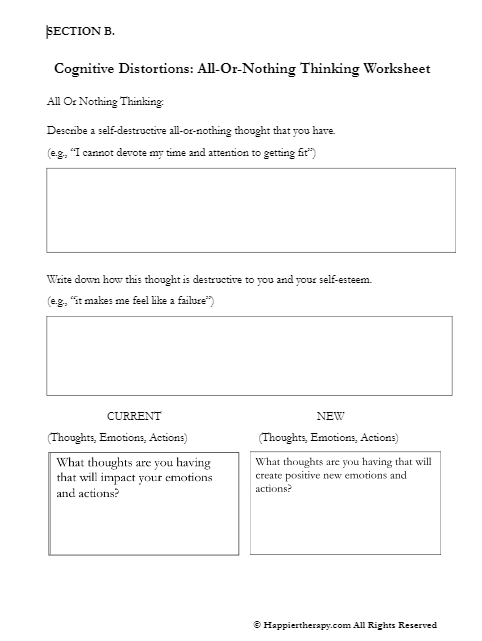Cognitive Distortions: Filtering Worksheet
Premium Content
Access this worksheet and 2,500 mental health worksheets. Cancel anytime
Introduction:
According to the American Psychological Association (APA), cognitive distortion can be defined as faulty or inaccurate thinking, perception or belief. (APA, © 2022) Often at times, cognitive distortions fuel our anxiety and increase our misery.
Enhance Your Therapy Sessions with research-backed worksheets
Customizable and fillable worksheets
Rights to alter the worksheets
Over 2000 worksheets
Support HappierTherapy
There are a number of cognitive distortions identified in Cognitive Behavioral Therapy, the most common include:
- All-or-Nothing Thinking/ Polarized Thinking
- Overgeneralization
- Mental Filters
- Catastrophizing/ Magnification or Minimization
- Mind Reading/ Jumping to Conclusions
- Predicting the Future
- Emotional Reasoning
- “Shoulds” Statements
- Labelling
10. Personalization and Blame
This particular worksheet will focus on: FILTERING.
What Are The Theories Behind This Worksheet?
Filtering, commonly known as Mental Filters, is one of the cognitive distortions whereby people tend to focus on one aspect of a situation: usually the negative side/ negative information/ negative details.
People who battle mental filtering often tend to magnify the negative side of a situation while filtering out the positives.
Many psychologists have found a strong link between focusing on negative details with depression, anxiety, and self-esteem. Research shows that there is a cognitive bias for dwelling on one’s shortcomings that can lead to fixating on negative feedback. (NESS LABS, no date)
Mental filtering can also have a detrimental impact on our self-confidence and personal growth. In order to manage this cognitive distortion, one has to learn to subconsciously manage negative thought patterns and begin to see their efforts and hard work in a more positive outlook. (NESS LABS, no date)
How Will This Worksheet Help You?
This worksheet is to help you recognize the occurrence of your mental filtering and increase your awareness around it. By understanding how your mental filter works, you are in a better position to gain control over your thoughts, emotions and actions.
Additionally, this worksheet is going to help you:
- Challenge your thought assumptions
- Consider alternatives to your mental filters
- Reframe/ Restructure your thoughts, emotions and actions
How Should You Use This Worksheet?
The first step is to change how you interpret and perceive different situations/ or events.
Practising mindfulness is an incredible way to your mental filtering recovery journey. Separating the good from the bad helps you to recognize automatic negative thinking and replace that with positive affirmation thoughts.
This worksheet can also be used as a daily self-evaluation kit.
Was this helpful?
References
1.-
American Psychological Association. (© 2022). Cognitive Distortion. Available at:
https://dictionary.apa.org/cognitive-distortion. [Accessed October 05, 2022].
2.-
NESS LABS. (No Date). Mental Filtering: When we focus on negative details. Available at: https://nesslabs.com/mental-filtering. [Accessed October 14, 2022].
 By
By
